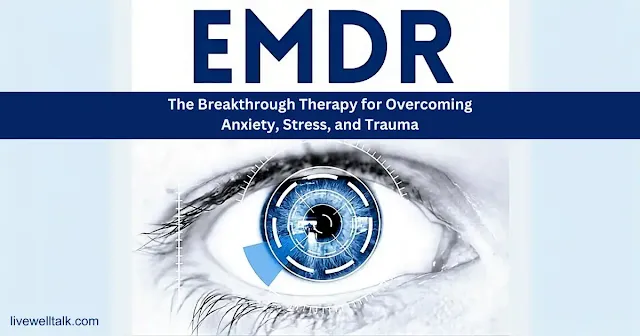The human mind is a complex and resilient landscape, but sometimes, it carries the scars of past experiences. Anxiety, stress, and trauma can leave their mark, impacting our daily lives and well-being. But amidst the darkness, a beacon of hope shines, EMDR (Eye Movement Desensitization and Reprocessing), a revolutionary therapy gaining traction for its remarkable ability to help individuals heal and reclaim their lives.
EMDR: The Breakthrough Therapy for Overcoming Anxiety, Stress, and Trauma
For many individuals, anxiety, stress, and trauma can create persistent challenges that impact daily life. While traditional therapies offer valuable support, one approach has gained significant attention for its potential to accelerate healing: Eye Movement Desensitization and Reprocessing (EMDR) therapy.What is EMDR?
Imagine this: you're revisiting a difficult memory, but instead of reliving the pain, your eyes gently follow specific patterns, guiding your brain towards a healthier way of processing the experience. That's the essence of EMDR, developed by Dr. Francine Shapiro in the 1980s.
It's not just talk therapy; it's a unique approach that incorporates bilateral stimulation (eye movements, tapping, or tones) while revisiting disturbing memories. This seemingly simple technique unlocks a powerful process within the brain, allowing it to:
- Reduce the emotional intensity of the memory, making it less overwhelming.
- Challenge negative beliefs associated with the trauma, fostering a more positive self-image.
- Develop healthier coping mechanisms for managing difficult emotions.
- Improve emotional regulation, leading to greater stability and well-being.
Learn more: How Does EMDR Therapy Work
Beyond Trauma: A Spectrum of Benefits
While EMDR initially gained recognition for its effectiveness in treating post-traumatic stress disorder (PTSD), its reach extends far beyond. This therapy can be a valuable tool for individuals struggling with...- Complex post-traumatic stress disorder (C-PTSD) [Learn more here on → EMDR Therapy for Complex PTSD]
- Anxiety disorders: phobias, generalized anxiety, social anxiety, panic attacks
- Depression and low mood
- Performance anxiety
- Grief and loss
- Chronic pain
- Eating disorders
- Substance abuse
The Breakthrough: Why EMDR Stands Out
Traditional psychotherapy often entails revisiting and reliving traumatic memories, which can be emotionally taxing. EMDR offers a gentler approach, avoiding prolonged dwelling on the trauma while still facilitating healing. This unique combination of cognitive, emotional, and physical processing sets EMDR apart and contributes to its success:
- Faster results: Studies show that EMDR can be more effective in reducing symptoms compared to traditional therapy, often in fewer sessions.
- Long-lasting effects: The positive changes achieved through EMDR can be sustained over time, offering lasting relief.
- Gentler approach: By focusing on processing and healing rather than reliving the trauma, EMDR can provide a more comfortable experience for individuals.
Is EMDR Right for You?
While EMDR offers immense potential, it's important to remember that every individual's healing journey is unique. Consulting a qualified EMDR therapist is crucial to determine if this therapy aligns with your specific needs and goals. They will assess your situation and guide you through the process with compassion and expertise.Finding Your EMDR Guide
Finding a qualified therapist is key to maximizing the benefits of EMDR. Look for therapists certified by the EMDR International Association (EMDRIA), ensuring they have the necessary training and experience. Don't hesitate to ask questions and connect with therapists who resonate with your needs and preferences. Learn more: The 8 Phases of EMDR Therapy: A Guide to Healing from Trauma
Remember:
Healing from anxiety, stress, and trauma is a journey, not a destination. EMDR can be a powerful tool, but it's not a magic cure. Be patient with yourself, committed to the process, and seek support from loved ones and mental health professionals along the way.
You are not alone. With the right resources and support, including EMDR therapy, you can unlock your inner strength, overcome challenges, and reclaim your life. Take the first step towards healing today.
Additional Resources
- EMDR International Association (EMDRIA): https://www.emdria.org This website offers comprehensive information about EMDR therapy, including research, training resources, and a directory of qualified EMDR therapists.
- National Center for PTSD: https://www.ptsd.va.gov/ This government-run website provides extensive resources on PTSD, including information about different treatment options, self-help tools, and a directory of mental health professionals.
- Anxiety and Depression Association of America (ADAA): https://www.adaa.org This leading mental health organization provides information and support for various anxiety disorders, including resources on finding treatment and building coping skills.
- International Society for Traumatic Stress Studies (ISSTSS): https://www.istss.org This professional organization dedicated to trauma research and education offers resources for individuals and professionals interested in learning more about trauma and its treatment.
Conclusion
EMDR offers a promising and innovative approach to healing from anxiety, stress, and trauma. It's not a magic bullet, but its ability to target the emotional core of negative experiences without requiring explicit retelling makes it a valuable tool for many individuals seeking relief.
Keep in mind, that the most important step towards healing is to reach out for professional help and explore the therapy options that best suit your unique needs and journey.


Comments
Post a Comment